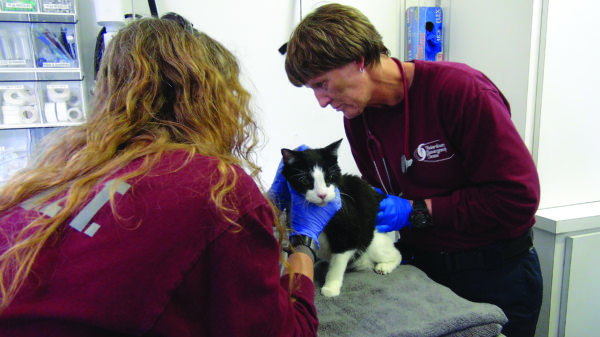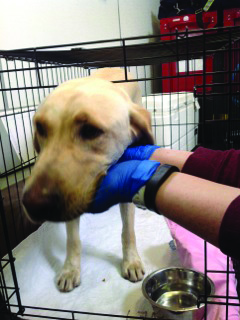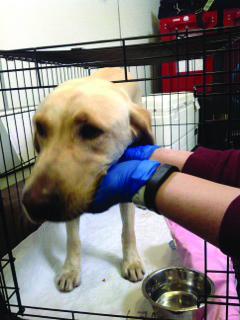In the Midst of Disaster Springs Hope

Memorial Day weekend-a time reserved to honor those who have served in the military and given their lives so that all can live in a free society. It is a time to reflect on the sacrifices of these men and women and celebrate all they have accomplished. However, the 2015 Memorial Weekend will also be remembered as an example of the strength and power of Mother Nature, especially in the minds of the residents and visitors to Wimberley, Texas.
Torrential rainfall in the Texas Hill Country changed the gentle flow of the Blanco River in Wimberley into a raging wall of water that carried away houses, trees, cars, and anything else left in its path. People were missing. Pets were left stranded in hasty evacuations.
The McComb family, and their friends, were vacationing in Wimberley for the holiday weekend. The house they were in was lifted from its foundation by the strength of the floodwaters and forced against a bridge. The house was swept away, leaving the father, Jonathan McComb, as the only survivor.
VET Provides Relief in Wimberley
As part of the large search and rescue effort, the Texas A&M; Veterinary Emergency Team (VET) deployed to Wimberley to provide veterinary medical support for the canine teams of Texas Task Force 1 (TTF1). Huge piles of debris, impassable roadways, and unstable structures all had to be searched. The dogs and their human handlers worked tirelessly in this precarious environment to rescue those who survived the night and to search for those still missing.
“These dogs are special,” said Dr. Deb Zoran, chief veterinary medical officer for VET. “They are trained to go into hazardous environments that are not safe for humans to look for missing persons that need rescue or recovery. They are at a high risk of injury and exposure to environmental hazards. Our partners on the urban search and rescue teams have recognized the value of onsite veterinary medical support in enabling their searches to be more effective.”
As the rains subsided and the sun rose, the heat and humidity created an additional challenge to the search teams: dehydration. Pre-search fluid therapy, ongoing veterinary examinations, and medical intervention throughout the day kept the canines in the field and on task longer and more safely.
Bringing Maggie Home
While teams were in the field, VET members began receiving and examining stranded pets to ensure injuries were treated and the animals eventually would be able to reunite with their owners. A Wimberley resident who had returned to evaluate the damage to his property brought in a yellow lab he found in the branches of a felled tree on his property. The dog did not belong to him, but he knew it would be important to get the dog back to the owner.


After treating the lab for minor injuries, the dog was scanned for a microchip. VET members then discovered that her name was Maggie, and she belonged to the McComb family. By this time, Jonathan was being treated for injuries in a nearby hospital, and the search was ongoing for the rest of his family and friends. Through the efforts of VET, Maggie was returned to the McCombs.
“To have someone find an animal in the middle of devastation and care enough to seek help is a tremendous example of the compassion and neighbor-helping-neighbor mindset we witnessed in Wimberley,” said Dr. Wesley Bissett, director of VET. “Stories like Maggie McComb are why we do what we do. The intangible benefit of returning a pet to its owner lies at the core of our mission. We were humbled by the outpouring of generosity from a community recovering from a disaster, as well as by the opportunity to play a part in the healing process by caring for pets, like Maggie, who represent hope for someone.”
The search efforts in Wimberley came to a close; the VET was redeployed to provide similar search and rescue support to Texas Task Force 2 (TTF2), a team continuing the search for the missing from their base of operations in San Marcos. Due to the ongoing heat and humidity, the VET sent teams into the field with the search and rescue units to provide on-scene veterinary support. Most resident animal issues were addressed by the local animal shelter, but a Wimberley resident who was staying with family in San Marcos made a critical visit to the VET base of operations.
“In San Marcos, we worked with some new canine teams that we had not worked with before,” said Zoran. “The handlers, like those with Task Force 1, are such a dedicated group-dedicated to their mission and dedicated to their canine partners. It was great to begin building long-term relationships with these new handlers and their teams.” But the opportunity to serve through caring for animals was not limited to just the search and rescue canines.
Healing August
Natalie Taylor evacuated her Wimberley residence as quickly as she could, but was unable to locate her oldest cat, August. As Taylor returned to her home, she found August waiting for her. She cleaned August up and brought him back to San Marcos. However, due to age and the stress of the disaster, August’s health began failing. Taylor heard about the VET and took August to the VET’s mobile medical trailer to see if he could be helped.
August was treated with fluids and medications, and Taylor was told that the prognosis was not good. Taylor took August home with instructions to return the next day for an evaluation. When Taylor arrived the next afternoon, August had made significant improvement. He was a survivor. More than that, like Maggie, August provided a glimmer of hope that after disaster life can begin again.
“August’s story is an illustration of what our team is all about,” added Bissett. “As Aggies, we serve the state of Texas through excellence and selfless service. Providing support for the human-animal bond through caring for and reuniting pets with their owners during a disaster is not just a job-it’s our mission, our purpose, our duty, and our privilege.”
Disasters are fraught with devastation and despair, and the shock of sudden loss is hard to recover from. Pets who are separated and then reunited with their families during the recovery period provide the first step toward healing and the assurance that life continues and can be rebuilt. The vital support the VET provides in emergency situations helps support efforts to rescue and find the missing and to help those animals and their owners impacted by disasters to have a new beginning.


